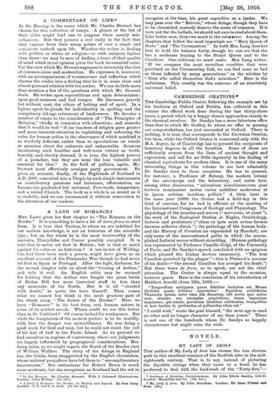A LAND OF ROMANCE.t Mxs. LANG gives her first chapter
to " The Romans on the Border." It is something to have a bit of terra firma to start from. It is true that Tacitus, to whom we are indebted for our earliest knowledge, is not an historian of the scientific type ; but on the whole he is the most trustworthy of the ancients, Thucydides and Caesar possibly excepted. It is true that he never set foot in Britain ; but is that so much against his value as an historian P A son-in-law of Welling- ton, had there been such a person, might have given us an excellent account of the Peninsular War though he had never set foot in Spain or Portugal. After the light, darkness, for the second chapter tells us about the " Coming of Arthur," and tells it well. An English critic may be excused for holding that the Arthur who fought the great battle of Badon Hill has more historical stuff in him than any namesake of the North. But it is all " clouded with doubt," to quote the hero himself. Then comes what we cannot but think is the most gracious part of the whole story, " The Saints of the Border." Here we have "Romance" in its best form, real human nature in some of its noblest moods. Where could we see this better than in St. Cuthbert P Of course he had his weaknesses. But while the temptation of the modern prelate is to be worldly, with him the danger was unworldliness. He was doing a good work for God and man, but he could not resist the call of his but of turf in the Fame Island. As we proceed we find ourselves in regions of controversy, where our judgments are largely influenced by geographical considerations. Mrs. Lang takes, as we might expect, the North of the Border view of William Wallace. The story of his doings in England has, she thinks, been exaggerated by the English chroniclers, whose national prejudices have led them to " uncomplimentary inaccuracies." Her enthusiasm for Robert Bruce is much more moderate, but she recognises, as Scotland had the wit to
* In the Evening. By Charles Stewart. With 2 Coloured Illustrations. London : John Murray. [6s. not.] t A Land of Romance the Border, its History and Legend. By Jean Lang. London : T. C. and E. C. Jack. [7a. 6d. net.] recognise at the time, his great capacities as a leader. We may pass over the " Reivers," whose doings, though they have to be chronicled, scarcely deserve the name of romance. If it were not for the ballads, we should not care to read about them. Like better men, they owe much to the vates racer. Among the chapters that follow the most important are " Mary Queen of Scots " and " The Covenanters." In both Mrs. Lang does her best to hold the balance fairly, though we can see that she has a moderate leaning to the Stuart Queen and to the Cavaliers. One criticism we must make. Mrs. Lang writes : "If we compare the most merciless cruelties that were practised on the Covenanting folk, we can find none so bad as those inflicted by many generations" on the witches by " those who called themselves God's ministers." Here is the unfairness. This cruelty was the outcome of an absolutely universal belief.














































 Previous page
Previous page